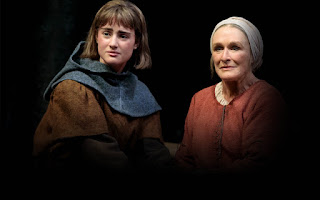Theater Review: A Raucous Examination of Modern Feminism

Collective Rage: A Play in Five Betties Written by Jen Silverman Directed by Mike Donahue MCC Theater, Manhattan September 30, 2018 Since this is the year of theater treatments of gender and race issues, we should expect a range of experiences. My last review cast a serious light on the contrasting challenges women face in career vs. mother roles, featuring a dominant Glenn Close as Joan of Arc’s mother. Collective Rage was something entirely different—profane, chaotic, non-noble, but was a more honest treatment of the topic. This was the funniest play I have seen since Mankind . Interestingly, both were single-sex cast treatments of changing gender roles, here five disparate but uniformly hysterical women portraying a range of women from different generations and economic classes, all named Betty. The word “pussy” probably occurred one hundred times, and was sort of a leitmotiv for explaining all sorts of actions, feelings, and conundrums faced by women in modern soci


